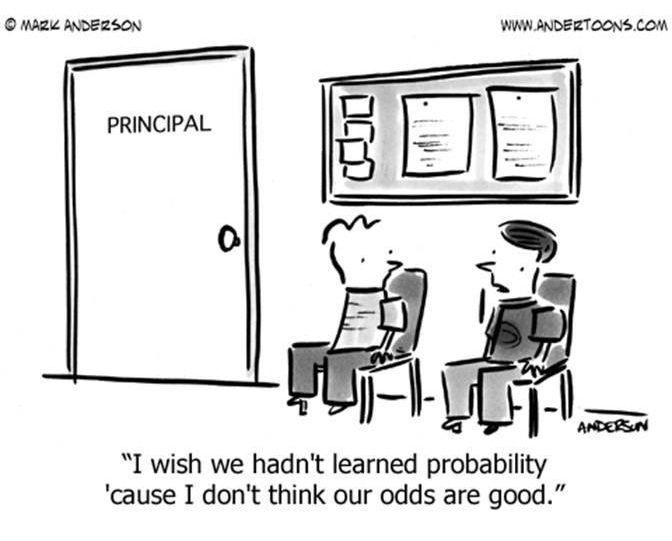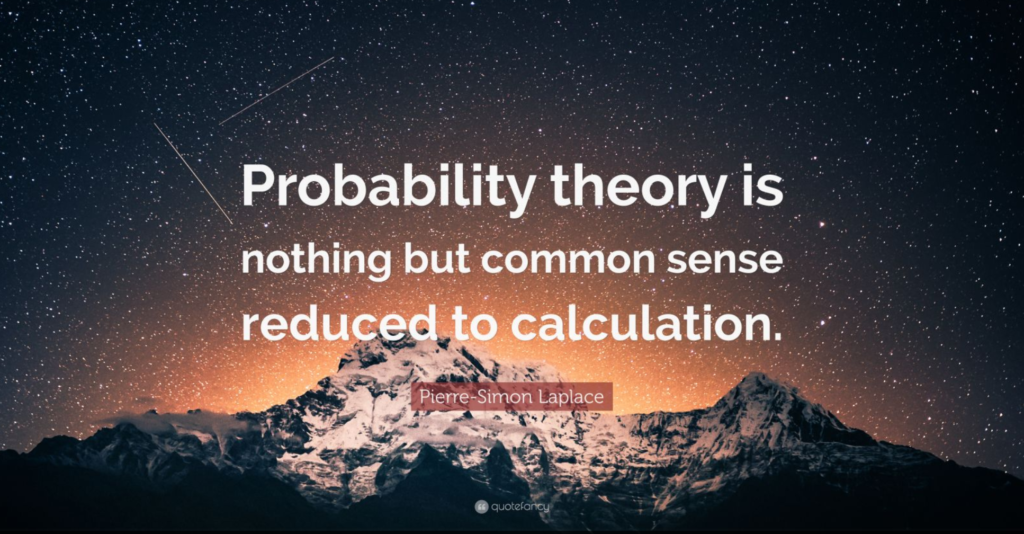
Succeeding in life is a numbers game. Understanding the likelihood of your success has become a necessity in an increasingly competitive world. Learn five guidelines that will help you play the numbers game in your life, without losing steam, and maximize your odds no matter how many times you face rejection. (Estimated reading time: 6 minutes)
“Success is a numbers game; there is a direct relationship between the number of things you try and your probability of ultimately succeeding.”
— Brian Tracy
Can you remember sitting through a math class wondering why you were taught things you’ll most likely never use again? As a high schooler, I admit, I had those same thoughts whenever my teachers filled the blackboard with impenetrable trigonometry, equations, and calculus formulas.
Yet, math is much more than memorizing cryptic equations—it teaches us a logical and methodological approach to apply to life’s problems. The Pythagorean theorem and linear equations may be distant memories, but we still have the abstract thinking skills we gained from it.
Galileo Galilei once said that the laws of nature are written in the language of the universe, and by learning this language, you get to understand the core mechanisms by which the cosmos operates. You’ll see the balance, harmony, and order that characterizes its abstract beauty.
A numerical theory that’s valuable for daily life is the law of probability, which measures the likelihood of an event. Most of the time, you’re not going to use multiplication to calculate possible outcomes, but you will use subjective probability to decide the best course of action.

Probability is commonly used in areas with pre-existing data, like the weather, gaming, sports, and investment. However, if we know how to apply the theory appropriately to our specific situations, it can make us canny and discerning decision-makers.
Understanding the likelihood of success has become a necessity in an increasingly competitive world. The expanding human population has led to a fight for basic resources like food, water, jobs, and alliances.
Unless you’re a trust fund baby, a lottery winner, or someone who married into money, you have to learn how to market yourself. If you want to secure a job, you must highlight your strengths to potential employers. Attracting investors and customers for your business requires a convincing pitch. Finding the love of your life involves knowing the right things to say to woo a love prospect.
A significant aspect of this sales-oriented mindset is learning how to work with your odds and calculate your chances of drawing a winning hand. Like a poker player, you must analyze the cards you have been dealt and figure the odds, hoping that no other player has a better hand than you. But how many attempts is it going to take until you finally have a winning streak?

According to success coach Jack Canfield, life is simply a numbers game. He says, “You have to keep asking until you get a yes. The yes is out there waiting if you hang in there long enough. Out there somewhere, someone is waiting for you and your ideas.” To help us cope with the rejection we’ll inevitably face, Canfield created the acronym “SWSWSWSW” which stands for “some will, some won’t, so what—someone’s waiting.”
A thick-skinned, dominantly left-brained person can make it through rejection mostly unscathed, and even thrive in the face of competition. However, for sensitive and empathic individuals like myself, playing the numbers game can be draining. We would much rather sit in a quiet corner focused on the joy of creating, rather than face the dread of selling our wares and play the numbers game.
There’s no way of making a living or carving an identity in the world without enough “asks”— requests, propositions, or pitches that could lead to achieving your goal. But playing the numbers game is not for the faint of heart. It takes gritty perseverance, obstinacy, and a will to win at all costs. Rejection is a surety, and you’ll face a slew of temptations and easy-way-outs.
Without a strategic approach, we run the risk of the heavy psychological cost of burning out and a damaged self-esteem—an unwelcome byproduct of being constantly judged and sized up by others. Every time you lose and get rejected, it will sting, no matter how tenacious you are.

Without the right approach to play the numbers game, it’s easy to lose steam and give up. Maintain your inner stamina with these five guidelines:
1. Get clear on your negotiables and non-negotiables: While playing the numbers game, you’ll be faced with a lot of choices. This can be overwhelming, especially if you don’t have a lot of time to make up your mind. Knowing your negotiables (things you’re willing to compromise on), and your non-negotiables (deal breakers you won’t accept), will make the process smoother. They are unique to you and your situation, and only you can determine what they are, based on your values. With predetermined objectives in place, your focus won’t waiver from your vision.
2. Have a strategy and timeline: Taking the shotgun approach to play the numbers game is risky. Those who use it must be prepared for a hefty investment of energy and the uncertainty. If you do use this approach, have a good support system and a self-care regime in place. A structured approach, however, is more sustainable. Develop an initial plan based on your end goal and a timeline to guide your actions. Structure offers shelter when facing the unknown.
3. Do everything you can to maximize your odds: Winning at anything requires knowing the rules of the game, then learning how to play it better than anyone else. Mastery is what will get you noticed and beat the competition. Arm yourself with all the knowledge you can before acting. For example, if you’re bidding for a high position in your place of employment, get clear on who the decision-makers are, their criteria, and learn about other contenders. Armed with this knowledge, ask yourself what the tasks and qualities are that you can maximize to boost your chances at landing the role.
4. Narrow your scope and find a niche: The more people that occupy a particular space, the harder it is to find opportunities. Instead of wearing out from the struggle to get attention in a crowd, find a niche you can thrive in. It’s not something you’ll find right away—this knowledge comes after you carry out on your initial plan. When you gain sufficient insight, narrow your focus to the key areas that interest you and that speak to your strengths. Unburdened by competition, you’ll become more visible and have a stronger platform that gets noticed and recognized.
5. Aim for quality and targeted leads: As you narrow your focus and dominate a space, you’ll have more freedom to pick what suits you best. In the world of dating, when you know that you’re better matched with partners who value intelligence over physical beauty, you would find more success by going to educational events, museums, and book clubs. By frequenting venues that have a high concentration of your target “love type”, you’ll have a bigger pool to choose from.
It’s easy to feel insignificant in the face of competition. That’s why it’s essential to be kind to yourself as you brave the dog-eat-dog world. Remember that no matter how many doors slam in your face, and no matter how many people say “no” to you, you are more than enough and worthy of love and compassion.
All my best on your journey,
Seline

Question for you: Have you ever played the numbers game? Did it work for you? If not, what could you do differently next time?
Did you like this post? Sign up below, and I’ll send you more awesome posts like this every week

Thanks for sharing this insight with us. I had never ever really thought about this before but what you say here makes sense. A lot of sense actually. May have to think about this some. Thanks again for sharing!
You’re most welcome Leighann!
I love that you write it’s okay to keep trying, to keep asking, to keep searching. Finding our path in life and especially our purpose can take time. “It takes gritty perseverance” and there will be many “easy-way-outs”, you’re absolutely right. But if we keep pushing, we keep asking, and we keep trying, we will find the right outcome. –Ryan
Hey Ryan! It sure does and I’m sure you’ve seen this play out in your own life. That’s why people need resources like the one you provide! 🙂 Thanks for sharing your two cents.
Totally agree with you Ryan! So many ways to cut corners and get the easy path but it never pays off in the end. Short term success and easy options often do not really hold up and do not yield the results that we truly want and need. I think there are many people who could stand to learn this- and I know most of us need a reminder of it now and then- myself included!